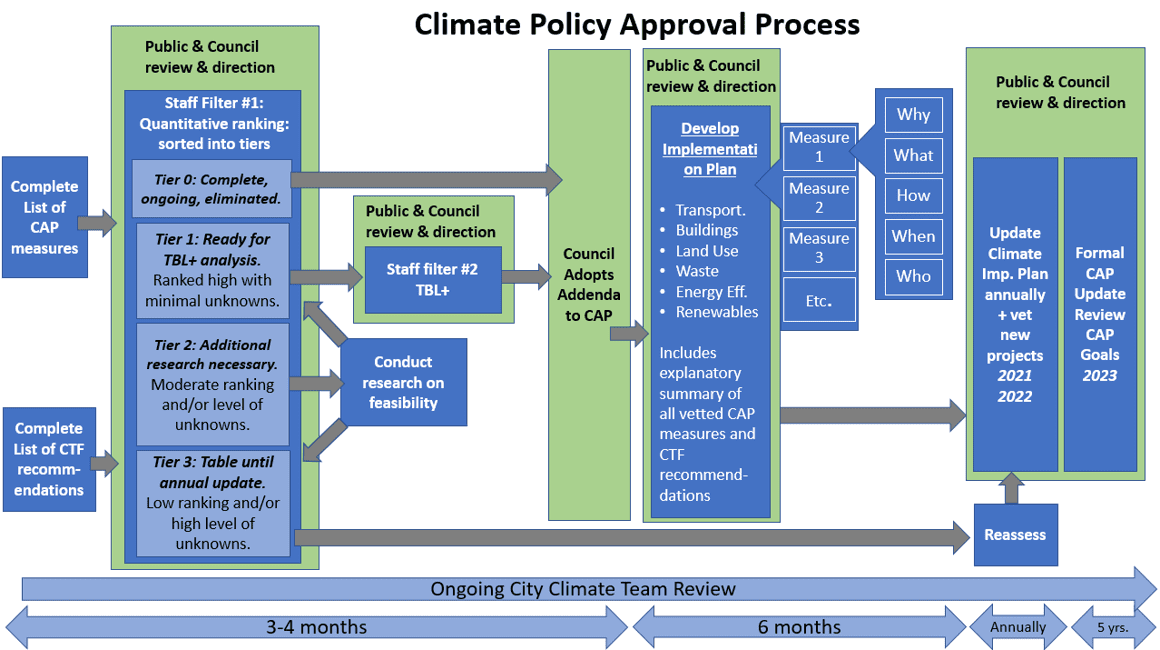On April 27, 2020, Bellingham City Council approved a vetting process, called a Climate Policy Approval Process, for City staff to identify items from the Climate Action Plan (CAP) measures and Climate Task Force (CTF) recommendations to implement each year. A 2021 Climate Implementation Plan was presented by staff to City Council on February 8, 2021. The Implementation Plan is essentially a climate work plan for City staff that will be updated annually.
Council Presentations
The following are links to staff presentations to City Council regarding the Climate Policy Approval Process that City staff follow when developing the annual Implementation Plan:
- February 8, 2021 Council meeting – City staff present the 2021 Implementation Plan, which details the items from the Climate Action Plan that City staff will be working on in 2021.
- November 23, 2020 Council meeting – Council approves a Resolution to amend the Climate Action Plan.
- November 9, 2020 Council meeting – City staff present the second Filter #2 Report for the Climate Policy Approval Process to Council.
- September 14, 2020 Council meeting – City staff present the first Filter #2 Report for the Climate Policy Approval Process to Council.
- June 8, 2020 Council meeting – City staff share the results of the first step of the Climate Policy Approval Process, Filter #1, with Council.
- April 27, 2020 Council meeting – City staff present a draft Climate Policy Approval Process to Council.
Climate Policy Approval Process Summary
The complex graphic below outlines the climate policy approval process that staff follow to determine which measures and recommendations to include in the Climate Implementation Plan each year. First, all 145 CAP measures and CTF recommendations are ranked and sorted into tiers in Staff Filter #1. Second, items that are sorted into Tier 1 move on to Staff Filter #2, where they are analyzed through a Triple Bottom Line – Plus (TBL+) study. After public input and approval from Council, high-ranking items in the TBL+ are then added to a Climate Implementation Plan, with an explanation of how each measure will be implemented. This plan is then updated annually. Staff Filters #1 and #2 are explained in further detail below.

Staff Filter #1 – Quantitative Ranking
Staff Filter #1 sorts the 145 items from the CAP and CTF into the four Tiers listed below. In general, items that demonstrate the largest overall potential for emissions reduction, relative to time and energy inputs, and score high within a list of several factors are placed into Tiers 1 and 2.
The Tiers used to sort the items in Staff Filter #1 are summarized as such:
- Tier 1: Ready for TBL+ analysis. These items have been ranked high and contain minimal unknowns. They are recommended for advancement to Staff Filter #2, the Triple Bottom Line – Plus (TBL+) feasibility study that is the second step of the vetting process.
- Tier 2: Additional research necessary. These items ranked moderately high and/or have a moderate level of unknowns. They need further evaluation to determine if they should be promoted to Tier 1 and then to Staff Filter #2 or demoted to Tier 3 for revaluation during the next annual vetting process.
- Tier 3: Table until next annual update. These items ranked low and/or have a high level of unknowns. Factors that determined assignment of measures to this tier include: Estimated low emissions reduction, not first in a sequence of measures, high staff time needed for research relative to output, not appropriate for City lead, or legal barriers.
- Tier 0: Complete, ongoing, eliminated. These are items that are complete as originally designed, are continuing in some form, or are no longer relevant as originally designed.
Staff Filter #2 – TBL+ Feasibility Study
Staff Filter #2, the second step in the vetting process, involves ranking the items sorted into Tier 1 during Staff Filter #1 using a Triple Bottom Line – Plus (TBL+) analysis. Staff consider greenhouse gas reduction, social, financial, environmental, and technological factors when evaluating the items.
Public Participation
The City is committed to ongoing and meaningful public participation in all decision-making processes and welcomes community involvement. Staff recognize the benefit in engaging the public to help inform Council decisions. There are several ways the public can provide input during the development of the annual Climate Implementation Plan, including providing verbal or written comment at City Council meetings; providing written comment to the Mayor or staff; engaging in focus groups, outreach meetings, surveys, workshops, tours or open houses, when available; asking questions and providing feedback on the Engage Bellingham website; and signing up to receive email updates to stay up to date on City climate work.
Resources
Contacts
Seth Vidaña, Climate Energy Manager
savidana@cob.org
